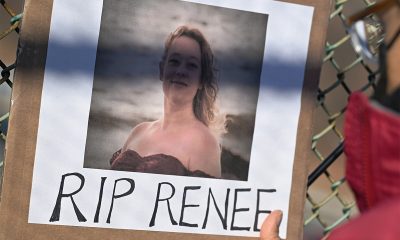News
White House silent on judicial nominee with anti-gay record
Boggs voted against marriage equality as Georgia state legislator


White House Principal Deputy Press Secretary Josh Earnest has no comment on a judicial nominee with an anti-gay record. (Washington Blade file photo by Michael Key)
White House Principal Deputy Press Secretary Josh Earnest had no comment on Thursday regarding a controversial judicial nominee with an anti-gay record — despite calls from progressive groups on President Obama to take back the selection.
Under questioning from The Huffington Post’s Jennifer Bendery, Earnest professed to have no knowledge of calls to remove Michael Boggs, whom President Obama tapped in December for a seat on the U.S. District Court for the Northern District of Georgia.
“I haven’t seen the statements from the groups that you mentioned,” Earnest said. “I’ll see if we can collect some more information and get back to you with a specific reaction.”
Earnest declined comment during the briefing after the White House for more than a week hasn’t responded to the Washington Blade’s request to comment on calls to remove Boggs.
Progressive groups say they’re troubled by Boggs because of his record as a state legislator in Georgia. Among his votes were against removing the Confederate emblem from Georgia’s state flag; in favor of a “Choose Life” license plate that helped fund anti-abortion groups; and in favor of strengthening parental consent laws to require a photo ID and for parents to accompany daughters under the age of 18 to abortion clinics — with no exception for rape or incest.
More relevant to the LGBT rights movement, Boggs in 2004 voted for legislation authorizing the referendum on the constitutional amendment to ban same-sex marriage in Georgia. It’s unclear whether he still holds that position, or, like many other lawmakers, he has since evolved to support marriage equality.
On Thursday, a group of 27 progressive groups — including a trio of LGBT groups, the Human Rights Campaign, GetEQUAL Action, and the National Gay & Lesbian Task Force — wrote to members of the Senate Judiciary Committee to urge them to reject Boggs.
“We believe that Boggs’s record on reproductive rights, civil rights, and LGBT rights is especially troubling in a nominee to the federal bench,” the letter states. “Litigants in Georgia, and the nation as a whole, deserve a judge whose commitment to equal justice is clear.”
A Senate aide said the committee doesn’t have all of the paperwork in for Boggs and hasn’t yet scheduled a confirmation hearing.
Boggs, who received his law degree in 1990 from Mercer University’s Walter F. George School of Law, has since 2012 served as a judge on the Georgia Court of Appeals.
In 2000, Boggs was elected as a Democrat to the Georgia State House, where he held office until 2004. From 2004 to 2012, he was a Superior Court Judge of the Waycross Judicial Circuit of the First Judicial Administrative District of Georgia of the Georgia Superior Court, where he established and presided over the court’s felony drug court program.
Although the Task Force has already called on Obama to recall the nomination, the presence of HRC on the letter is notable because the organization had previously said it was awaiting Boggs’ hearing before making a judgment on the nominee.
Fred Sainz, vice president of communications for the Human Rights Campaign, said he had no comment Thursday on the White House’s continued silence and deferred questions about HRC’s change in position to the letter.
According to The Huffington Post, Obama’s choice of Boggs is part of a package deal struck between the president and Georgia’s two Republican senators, Saxby Chambliss and Johnny Isakson. Four of the six nominees are GOP picks, and just one is black, but the trade-off is that other Georgia nominees in the package will now move forward after years of going nowhere.
Obama faces requests to remove Boggs as he met with black civil rights leaders on Tuesday to discuss issues including criminal justice reform and income inequality.
Asked whether Boggs came up during these discussions, Earnest referred to a White House blog posting on the event without mentioning in the controversial judicial nominee.
“I think there’s a blog post available at whitehouse.gov about the conversations that the president had with those leaders,” Earnest said. “They talked about the Affordable Care Act, and work in communicating to the American public, and particularly to individuals in the African-American community, the potential benefits that are available to them at healthcare.gov, and some of the protections that were put in place for consumers because of the Affordable Care Act. I know they had conversations about some of the ideas to criminal justice reform that the president and the attorney general both discussed. In terms of specifics, I can’t go beyond that, in terms of whether or not a specific judicial nominee came up.”
Florida
DNC slams White House for slashing Fla. AIDS funding
Following the”Big Beautiful Bill” tax credit cuts, Florida will have to cut life saving medication for over 16,000 Floridians.

The Trump-Vance administration and congressional Republicans’ “Big Beautiful Bill” could strip more than 10,000 Floridians of life-saving HIV medication.
The Florida Department of Health announced there would be large cuts to the AIDS Drug Assistance Program in the Sunshine State. The program switched from covering those making up to 400 percent of the Federal Poverty Level, which was anyone making $62,600 or less, in 2025, to only covering those making up to 130 percent of the FPL, or $20,345 a year in 2026.
Cuts to the AIDS Drug Assistance Program, which provides medication to low-income people living with HIV/AIDS, will prevent a dramatic $120 million funding shortfall as a result of the Big Beautiful Bill according to the Florida Department of Health.
The International Association of Providers of AIDS Care and Florida Surgeon General Joseph Ladapo warned that the situation could easily become a “crisis” without changing the current funding setup.
“It is a serious issue,” Ladapo told the Tampa Bay Times. “It’s a really, really serious issue.”
The Florida Department of Health currently has a “UPDATES TO ADAP” warning on the state’s AIDS Drug Assistance Program webpage, recommending Floridians who once relied on tax credits and subsidies to pay for their costly HIV/AIDS medication to find other avenues to get the crucial medications — including through linking addresses of Florida Association of Community Health Centers and listing Florida Non-Profit HIV/AIDS Organizations rather than have the government pay for it.
HIV disproportionately impacts low income people, people of color, and LGBTQ people
The Tampa Bay Times first published this story on Thursday, which began gaining attention in the Sunshine State, eventually leading the Democratic Party to, once again, condemn the Big Beautiful Bill pushed by congressional republicans.
“Cruelty is a feature and not a bug of the Trump administration. In the latest attack on the LGBTQ+ community, Donald Trump and Florida Republicans are ripping away life-saving HIV medication from over 10,000 Floridians because they refuse to extend enhanced ACA tax credits,” Democratic National Committee spokesperson Albert Fujii told the Washington Blade. “While Donald Trump and his allies continue to make clear that they don’t give a damn about millions of Americans and our community, Democrats will keep fighting to protect health care for LGBTQ+ Americans across the country.”
More than 4.7 million people in Florida receive health insurance through the federal marketplace, according to KKF, an independent source for health policy research and polling. That is the largest amount of people in any state to be receiving federal health care — despite it only being the third most populous state.
Florida also has one of the largest shares of people who use the AIDS Drug Assistance Program who are on the federal marketplace: about 31 percent as of 2023, according to the Tampa Bay Times.
“I can’t understand why there’s been no transparency,” David Poole also told the Times, who oversaw Florida’s AIDS program from 1993 to 2005. “There is something seriously wrong.”
The National Alliance of State and Territorial AIDS Directors estimates that more than 16,000 people will lose coverage
Colombia
Gay Venezuelan opposition leader: Country’s future uncertain after Maduro ouster
Yendri Rodríguez fled to Colombia in 2024 after authorities ‘arbitrarily detained’ him

A gay Venezuelan opposition leader who currently lives in Colombia says his country’s future is uncertain in the wake of now former President Nicolás Maduro’s ouster.
The Washington Blade spoke with Yendri Rodríguez on Thursday, 12 days after American forces seized Maduro and his wife, Cilia Flores, at their home in Caracas, the Venezuelan capital, during an overnight operation.
Maduro and Flores on Jan. 5 pleaded not guilty to federal drug charges in New York. The Venezuelan National Assembly the day before swore in Delcy Rodríguez, who was Maduro’s vice president, as the country’s acting president.
Rodríguez, who lives in the Colombian capital of Bogotá, described the events surrounding Maduro’s ouster as “very confusing.”
“It was a very surprising thing that left me in shock,” Rodríguez told the Blade. “We also thought, at least from the perspective of human rights, that the United States was going to respect international law and not go to the extreme of bombing and extracting Maduro.”
“Other questions also arise,” he added. “What could have been done? What else could have been done to avoid reaching this point? That is the biggest question posed to the international community, to other countries, to the human rights mechanisms we established before Trump violated international law, precisely to preserve these mechanisms and protect the human rights of Venezuelan people and those of us who have been forced to flee.”
Rodríguez three years ago founded the Venezuelan Observatory of LGBTIQ+ Violence. He also worked with Tamara Adrián, a lawyer who in 2015 became the first openly transgender woman elected to the Venezuelan National Assembly, for more than a decade.
Members of Venezuela’s military counterintelligence agency, known by the Spanish acronym DGCIM, on Aug. 3, 2024, “arbitrarily detained” Rodríguez as he was trying to leave the country to attend a U.N. human rights event in Geneva.
Rodríguez told the Blade he was “forcibly disappeared” for nearly nine hours and suffered “psychological torture.” He fled to Colombia upon his release.
Two men on Oct. 14, 2025, shot Rodríguez and Luis Peche Arteaga, a Venezuelan political consultant, as they left a Bogotá building.
The assailants shot Rodríguez eight times, leaving him with a fractured arm and hip. Rodríguez told the Blade he has undergone multiple surgeries and has had to learn how to walk again.
“This recovery has been quite fast, better than we expected, but I still need to finish the healing process for a fractured arm and complete the physical therapy for the hip replacement I had to undergo as a result of these gunshots,” he said.

María Corina Machado, who won the 2025 Nobel Peace Prize, and other Venezuelan opposition leaders said Maduro’s government targeted Rodríguez and Peche. Colombian President Gustavo Petro and his government also condemned the attack.
Colombian authorities have yet to arrest anyone in connection with the attack.
Rodríguez noted to the Blade he couldn’t sleep on Jan. 3 because “of the aches and pains” from the shooting. He said a friend who is “helping me out and looking after my things” was the one who told him about the operation the U.S. carried out to seize Maduro and Flores.
“He said, ‘Look at this! They’re bombing Caracas! And I was like, ‘What is this?'” recalled Rodríguez.
White House ‘not necessarily’ promoting human rights agenda
Rodríguez noted Delcy Rodríguez “is and forms part of the mechanisms of repression” that includes DGCIM and other “repressive state forces that have not only repressed, but also tortured, imprisoned, and disappeared people simply for defending the right to vote in (the) 2024 (election), simply for protesting, simply for accompanying family members.” Yendri Rodríguez told the Blade that “there isn’t much hope that things will change” in Venezuela with Delcy Rodríguez as president.
“Let’s hope that countries and the international community can establish the necessary dialogues, with the necessary intervention and pressure, diplomatically, with this interim government,” said Yendri Rodríguez, who noted hundreds of political prisoners remain in custody.
He told the Blade the Trump-Vance administration does not “not necessarily” have “an agenda committed to human rights. And we’ve seen this in their actions domestically, but also in their dealings with other countries.”
“Our hope is that the rest of the international community, more than the U.S. government, will take action,” said Yendri Rodríguez. “This is a crucial moment to preserve democratic institutions worldwide, to preserve human rights.”
Yendri Rodríguez specifically urged the European Union, Colombia, Brazil, and other Latin American countries “to stop turning a blind eye to what is happening and to establish bridges and channels of communication that guarantee a human rights agenda” and to try “to curb the military advances that the United States may still be considering.”

Yendri Rodríguez told the Blade he also plans to return to Venezuela when it is safe for him to do so.
“My plan will always be to return to Venezuela, at least when it’s no longer a risk,” he said. “The conditions aren’t right for me to return because this interim government is a continuation of Maduro’s government.”
Editor’s note: International News Editor Michael K. Lavers was on assignment in Bogotá, Colombia, from Jan. 5-10.
Maryland
Layoffs and confusion at Pride Center of Maryland after federal grants cut, reinstated
Trump administration move panicked addiction and mental health programs

By ALISSA ZHU | After learning it had abruptly lost $2 million in federal funding, the Pride Center of Maryland moved to lay off a dozen employees, or about a third of its workforce, the Baltimore nonprofit’s leader said Thursday.
The group is one of thousands nationwide that reportedly received letters late Tuesday from the Trump administration. Their mental health and addiction grants had been terminated, effective immediately, the letters said.
By Wednesday night, federal officials moved to reverse the funding cuts by the Substance Abuse and Mental Health Services Administration, estimated to total $2 billion, according to national media reports. But the Pride Center of Maryland’s CEO Cleo Manago said as of Thursday morning he had not heard anything from the federal government confirming those reports.
The rest of this article can be read on the Baltimore Banner’s website.
-

 U.S. Supreme Court3 days ago
U.S. Supreme Court3 days agoSupreme Court hears arguments in two critical cases on trans sports bans
-

 Photos5 days ago
Photos5 days agoPHOTOS: ‘ICE Out For Good’ Sunday protests
-

 Arts & Entertainment5 days ago
Arts & Entertainment5 days agoTeyana Taylor, Erin Doherty have big night at Golden Globes
-

 Virginia5 days ago
Virginia5 days agoMark Levine running in ‘firehouse’ Democratic primary to succeed Adam Ebbin

















